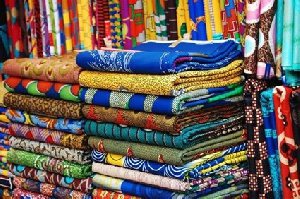 Local textile producers estimate that about 77 percent of all textiles sold are pirated
Local textile producers estimate that about 77 percent of all textiles sold are pirated
Feel the fabric of your favourite ‘Africa wear’ that you cannot do without on Fridays. Chances are that it is not the original high quality and toxic-free material you think you bought.
Local textile producers estimate that about 77 percent of all textiles sold in the country are pirated and may be harmful to consumers who are exposed to toxic chemicals used in the production of these materials.
The textiles of the three main local manufacturers --Akosombo Textiles Limited (ATL), Printex and Tex Styles Limited (GTP), currently account for just 23 percent of the 130 million yards per annum of textiles consumed in the country.
ATL, the only one out of the three that produces the grey cloth ---the processed cotton on which the printing is done on--is currently operating at about 40 percent of its 2 million yards per month capacity and has laid-off over half of its 2000 employees as a result.
“The annual consumption of textiles is about 130 million yards, but we can only afford to produce 30 million yards among the three largest local manufacturers ---ATL, GTP and Printex,” said Justice Asiedu Boateng, Finance and Administrative Manager of ATL.
He was speaking during a visit by the Parliamentary Select Committee on Trade, Industry and Tourism to the factory in Akosombo in the Eastern Region.
“We are producing at 40 percent of our capacity at the moment, so we are going down. The whole market share has gone off by about 80 percent. We are faced with a great challenge and we need assistance to help revive the industry. Our challenges include: high interest rate, high electricity tariffs, fluctuating exchange rate, smuggling, piracy and counterfeiting which require a concerted effort to tackle,” he said.
He added that: “These are the industries that we have in Ghana and we must seek to protect it so that Ghanaians can be gainfully employed, we shouldn’t aid it to collapse. We crave the indulgence of all Ghanaians to help sustain these industries,” Mr. Boateng appealed.
Textiles manufacturing process requires a lot of locally sourced raw materials such as salt, shea butter and cassava starch. It is therefore expected that, if well supported, the industry would have a ripple effect on economic development and job creation.
“We are not against competition, but what we are against is smuggled, pirated and counterfeited textiles producer who do not respect intellectual property rights. They should go through the boarders, pay the taxes which will bring price at par and then, we can all sell. Copying of brands and designs are not helpful and also putting the name of Akosombo Textiles on the prints that do not belong to us is illegal.When all these are done, prices would be at par. These are the things we expect as first step to curtailing the situation,” he added. Although, ATL is in discussions with government on how to get alternative source of funding, Mr. Boateng noted that it was high time the government also looked at ways of lowering energy cost and other tariffs, comparative to Ghana’s neighbouring countries, adding: “If we do not partner each other, we would be found wanting and these industries will die of.”
“We are really not asking for a ban on the products, but we are in for a fair competition. We are saying that let it come in through the approved routes where the requisite taxes will be paid” he further said.
The visit by the Parliamentary Committee on Trade, Industry and Tourism was to ascertain the operational challenges that ATL and other players in the industry are confronted with.
On his part, Marfo Nana Amaniampong, Chairman of the Committee, said his outfit was committed to doing all it can to help ATL and the entire industry.
“As a team, we would do our best to make sure that if not all, most of the challenges are addressed. If we should sit down for ATL to collapse then we don’t know the direction that this country will be going, so are giving them the assurance that this Committee will report to the Speaker and also get in touch with the Minister for Trade and Industry so together, we will think through what we can do to ensure that in the next five years, ATL and other textile companies see a positive turnaround in their fortunes.